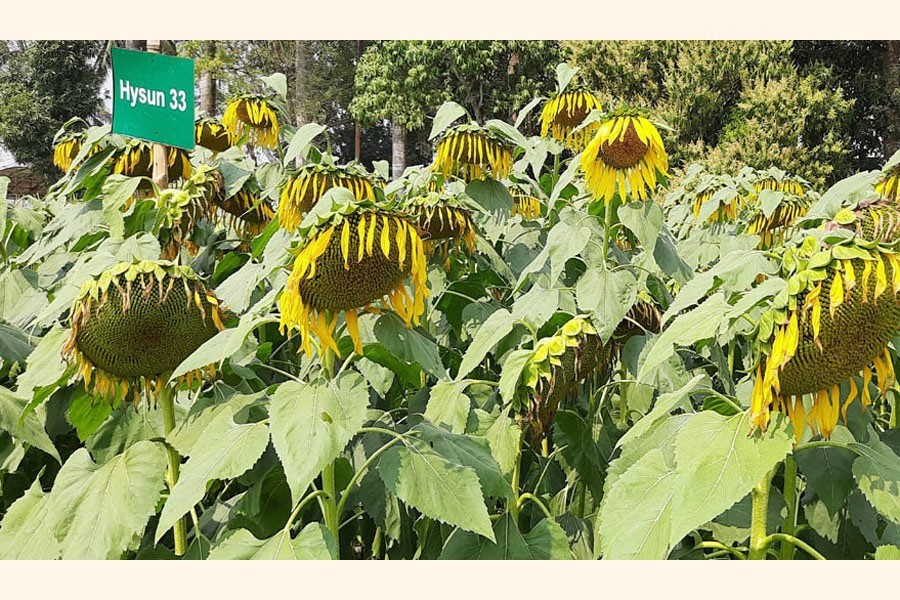KHULNA: Sunflower cultivation has achieved a success in the saline fallow lands of the coastal upazilas of Khulna.
As a result, new possibilities have emerged to meet the demand for high quality oil. Farmers expect to benefit following a lower production cost.
Under Gopalganj-Khulna-Bagerhat-Satkhira-Pirojpur Agriculture Development Project (SRDI), research is being conducted on sunflower cultivation in the Rabi season in the Salinity Management and Research Center of Batiaghata upazila of Khulna where sunflower seeds have been sown in the wet soil by dubbing method after harvesting Aman paddy in mid-November. Then the roots of the seedlings were tied and fertiliser was applied. Three varieties of species have been used in the study. Local, Bari Sunflower-2 and Hysun-33, all three varieties bear fruit. Of these, the yield of Hysun-33 has been good. According to the research authorities, it will be possible to harvest sunflower seeds of this variety in the first week of March.
According to the chief scientific officer of the Center for Salinity Management and Research, sunflower is a salt tolerant crop. As a result, there is huge potential for sunflower cultivation in saline areas. In the south, after harvesting Aman paddy, vast tract of lands remain barren. It is difficult to grow any other crop easily as there is salt in the soil and water. If sunflower is cultivated with two irrigations in dubbing method, the fallow land will come under cultivation, he said. As it is an excellent oil crop, it will meet the demand for sunflower oil which is very beneficial for the human body. This technology needs to be spread across the southern region to encourage farmers to cultivate sunflower, he added.
According to the Khulna District Agricultural Extension Department officials, 38 metric tonnes of sunflower seeds were produced in a total of 19 hectares of land in the district in the 2016-2017 financial year. In the 2017-2018 financial year, nine metric tonnes of sunflower seeds were produced by cultivating sunflower in a total area of five hectares in the district.
In the 2018-2019 financial year, two metric tonnes of sunflower seeds were produced in one hectare of land in the district. Then in the fiscal year 2019-2020 (Rabi), 32 metric tonnes of Kharif-1 variety of sunflower seeds were cultivated in a total area of 14 hectares in the district. This year, sunflower has been cultivated on more than 14 hectares of land, they said.
Ruhidash Sardar, a farmer of Batiaghata upazila, said, "I have cultivated sunflower on one Bigha of the fallow land this year." The yield has been good. I will cultivate sunflower in future also.
Batiaghata Upazila Agriculture Officer Rabiul Islam said that the sunflower is a salt- tolerant crop. Its seeds contain 40-45 per cent linoleic acid. Also, since this oil does not contain harmful erotic acid, it is beneficial for heart patients. Most of the lands in the coastal area remain fallow after planting paddy in Aman season. This crop will reduce the amount of uncultivated land as well as meet the demand for local sunflower oil.
Farmers' interest in cultivating this crop at low cost has increased. This year the crop has also been good on the lands where sunflower has been cultivated. Seeing good yield, other farmers in the area have also shown interest in sunflower cultivation.


